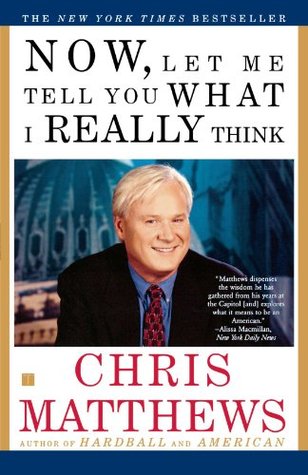Most political junkies in the United States are at least marginally familiar with Chris Matthews. The dustjacket of his most recent book—with a goofy, grinning Matthews in suit and tie superimposed over an image of the Capital dome—is meant to jog these people’s memories as they browse the local Barnes & Noble: Oh yeah, there’s that guy from MSNBC who talks a million miles a minute. And talk, he does (and talk, and talk).
“Five nights a week” (as Matthews says several times in Now Let Me Tell You What I Really Think), he wears his guests down not by condescending to them (like Peter Jennings) or yelling at them (à la Bill O’Reilly) but by speaking in such rapid-fire bursts that they, and the audience, have to struggle to keep up. His machine-gun mouth has been his greatest asset.
However, since the format of Matthews’ show is more interrogative than polemical, and since his previous books—Hardball and Kennedy & Nixon—were not manifestos, many listeners and guests began to speculate on where he stands politically. This book is about “forfeiting my Miranda rights” by responding to those speculations. As he says, “everything I say will be used against me.”
After reading the book, I can only wonder if it is meeting a real need. It isn’t as if your average dullard couldn’t accurately pigeonhole Matthews after pursuing the voluminous and publicly available clues. Matthews is a practicing Catholic from a working-class background. He served in the Peace Corps in Africa rather than go to Vietnam. He worked for Democrats on Capitol Hill, wrote speeches for Jimmy Carter, and was one of Tip O’Neill’s top aides. He got his start in journalism at the New Republic under the aegis of then-editor Hendrick Hertzberg. His syndicated column, though more reportorial in tone, reserves most of its fire for the GOP and most of its constructive criticism for the Democrats. If it walks like a liberal, quacks like a liberal, and votes like a liberal . . .
The features that keep the book entertaining are the same ones that keep the television show mildly so: the often dead-on political analysis, the biographical disclosures, and the occasional intemperate outbursts. Here, for instance, is Matthews on the kind of candidate the public prefers in presidential elections: While political scientists attempt to use sophisticated models, Matthews’ model “has just one variable: Look for the candidate you picture with the sun in his face.”
I present you a slide show:
FDR arriving in his open roadster to visit the troops.
Harry Truman giving ’em hell from the back of a train.
Ike riding down the canyons of Wall Street, the ticker tape streaming down from the high floored windows, his hands raised up with the V-sign, his smile as wide as Kansas.
The point, colorfully made, is that Americans prefer active candidates to desk jockeys. These populist instincts helped Matthews call the third presidential debate of 2000 for George W. Bush over Al Gore, in defiance of elite opinion. “The media cognoscenti had made their call,” he writes. “Gore had not only won, he had cleaned Bush’s clock!” However, both Matthews and
[t]he debate audience preferred the notion of having a guy in the White House who often spoke English as if it were his second language to one who spoke to us as if English were our second language.
For someone who went out of his way to avoid active military service in Vietnam, Matthews is surprisingly hard on the former Soviet Union and its useful idiots in the United States. At one point he asks, “Why do I still hate the Communists?” The answer is as nationalistic and biographical as it is moral and deftly manages to rope the antiwar left in with the Kremlin: “Because we could have lost it all to them.” All that time under his desk for air-raid drills, overseen by Sister Mary Somebody-or-Other, appears to have left an indelible impression.
Reading the chapter “Truth,” in which Matthews sounds off on various pressing issues of concern, I wished that his Jesuit education had left a still stronger impression. On abortion, Matthews writes that polls showing “the American people will not exact a token punishment from a woman who seeks an abortion” should tell pro-lifers “something very basic.” “The criminal code,” he opines, “is not the right instrument here.” Rather, the solution is for foes of abortion to make common cause with proponents to find ways to reduce the numbers of abortions while keeping abortion constitutionally protected. Safe, legal, and rare, remember?
Most of what Matthews “really thinks” is just as muddled as his alleged thinking on abortion. His politics “begin and end” with freedom, but not the freedom to opt out of Social Security or Medicaid or any other vote-buying handouts. Reparations for slavery are bad, but not if they are called “affirmative action.” Republicans should welcome gay-rights crusaders with open arms, even if that is unlikely to get them enough gay votes to replace the fundamentalist voters they will lose. AIDS in Africa is somehow a pressing matter of American national security.
A line is often arbitrarily drawn between “writing people” and “talking people.” The former are said to be more thoughtful and methodical and thus better suited to columns and longer essays; the latter, more dramatic and abrupt—more suited to radio and television. When a book idea is pitched to a talking person, a ghostwriter often has to translate the bombast into something coherent and readable. This time around, Matthews, a talking person’s talking person, might have been wise to heed that convention.
[Now Let Me Tell You What I Really Think, by Chris Matthews (New York: The Free Press) 220 pp., $25.00]

Leave a Reply